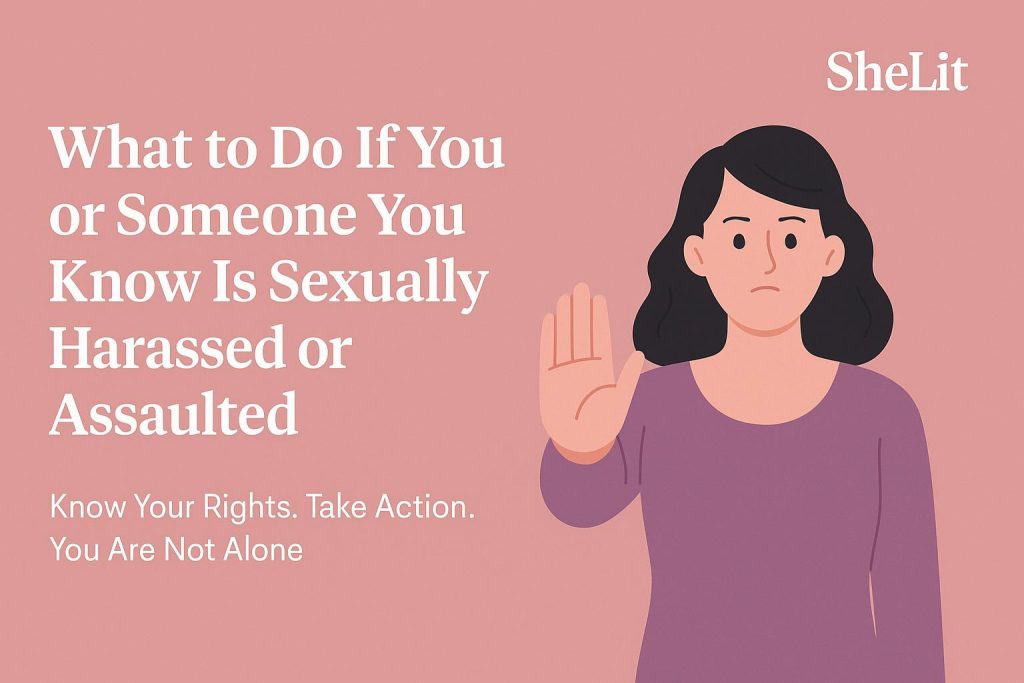Sexual harassment and assault are deeply traumatic experiences. Whether it happens to you or someone you care about, knowing what to do next can help protect your legal rights and begin the path to justice and healing. At SheLit, we believe awareness and action are the first steps to change.
This guide offers actionable steps, key helpline numbers, and a summary of legal rights available to survivors in India.
🚨 First Things First: Ensure Safety
- Find a safe space immediately—whether it’s a friend’s house, a public place, or your own home with trusted people.
- If you are in immediate danger, call 100 or reach the nearest police station.
📝 Step-by-Step Action Plan
- Reach Out for Help
Talk to someone you trust—a friend, family member, mentor, or support group. You do not have to face this alone.
If you’re unsure who to talk to, call a helpline (numbers below) that offers professional and confidential support.
- Preserve Evidence (If You Choose to Report)
- Do not bathe or change clothes before a medical examination, as this may destroy crucial evidence.
- Keep screenshots, messages, photos, or videos if the harassment happened online or through digital communication.
- Write down details—what happened, where, when, and who was involved or nearby.
- Seek Medical Attention
- Visit a government hospital for a medico-legal case (MLC) and medical care.
- Request a sexual assault forensic exam. It is your right and free of cost at government hospitals.
- File an FIR (First Information Report)
- Go to the nearest police station or call 100 or 112 to file an FIR.
- Under Indian law, the police must register your FIR, especially in cases involving sexual offences (Section 154 CrPC).
- You can ask for a lady police officer and record your statement in a confidential space.
- For minors (under 18), a complaint must be filed under POCSO Act provisions.
🛑 No one can deny lodging an FIR in such cases. It’s a legal obligation.
- Know Your Rights as a Survivor
✅ Right to Privacy
- Your identity cannot be disclosed in any media or public forum.
- Proceedings may be conducted in-camera (privately).
✅ Right to Legal Aid
- Free legal aid is available through District Legal Services Authorities (DLSA).
- You have the right to a support person or advocate during proceedings.
✅ Right to Immediate Medical Care
- Medical care must be provided without police requisition.
- Hospitals are legally required to treat survivors immediately.
✅ Right to Compensation
- You may be eligible for compensation under schemes like Nirbhaya Fund or Victim Compensation Scheme (varies by state).
| Helpline | Number | Details |
| Women Helpline (All India) | 1091 | 24×7, for harassment or Violence |
| National Emergency Number | 112 | Integrated emergency service |
| Police Emergency | 100 | |
| Childline (For Minors) | 1098 | Operated by Childline India |
| National Comission for Women | 7827170170 | Whatsapp complaints also accepted |
| Sakhi One-Stop Centres | Varies by Cities | Shelter, Legal, and Medical aid |
| Mental Health Helpline | 9152987821 | Free, Confidential support |
⚖️ Legal Provisions You Should Know
- Section 354 (IPC) – Outraging modesty of a woman
- Section 354A – Sexual harassment
- Section 376 – Rape
- POCSO Act – Protection of Children from Sexual Offences (for survivors below 18)
- Sexual Harassment of Women at Workplace (Prevention, Prohibition and Redressal) Act, 2013 – Protection in professional settings
🧠 Emotional and Mental Health Support
Healing is a journey. Sexual trauma impacts not just the body, but also the mind and spirit.
- Reach out to trained counselors or psychologists.
- Join support groups.
- Practice self-care and give yourself time.
Remember: You are not to blame. You are not alone. You are strong.
👥 What If You Know Someone Who’s Been Harassed or Assaulted?
- Believe them. Do not question or doubt their experience.
- Support their decisions—whether to report or not.
- Offer help—be it emotional support, accompanying them to the hospital, or helping file a complaint.
- Share this guide and help them connect with the right resources.
Sexual harassment and assault are serious crimes, and survivors have the right to justice, dignity, and support. Whether you’re a survivor or a supporter, knowing the right steps to take can make all the difference.
“Speak up. Reach out. The law is on your side. And so are we.”
💡 Share this article to raise awareness. Let’s create a safer world for every woman, every girl.
SheLit Desk

